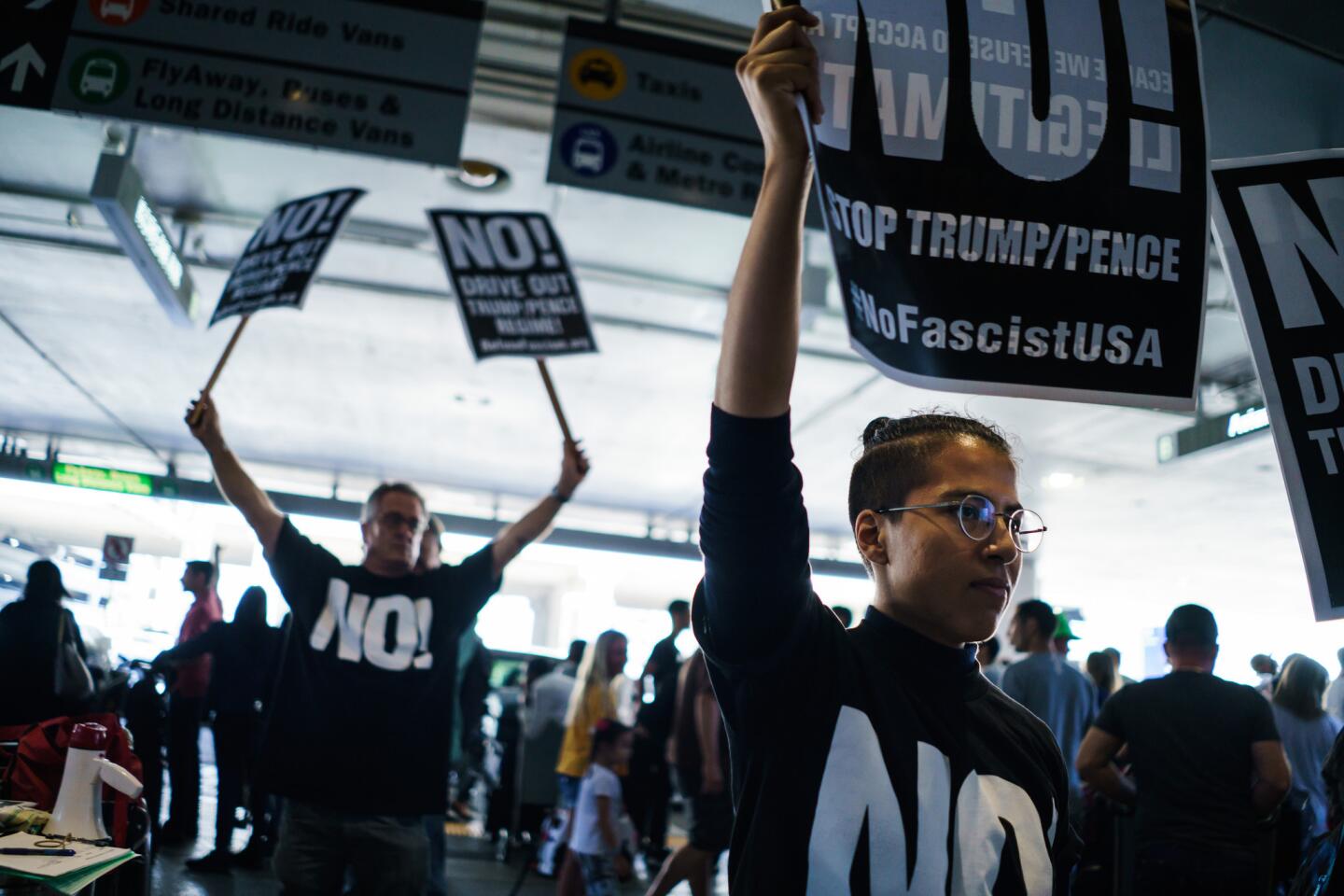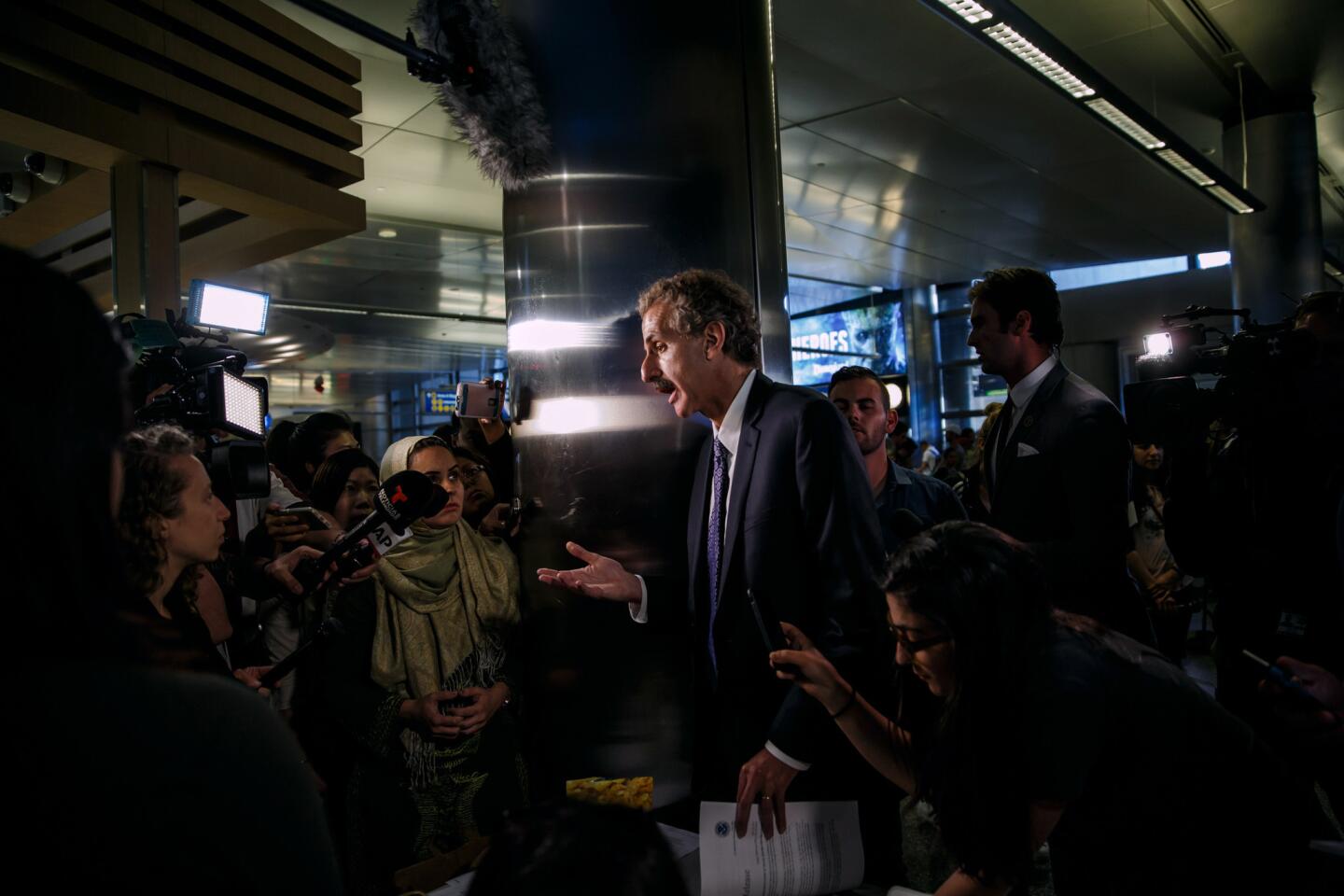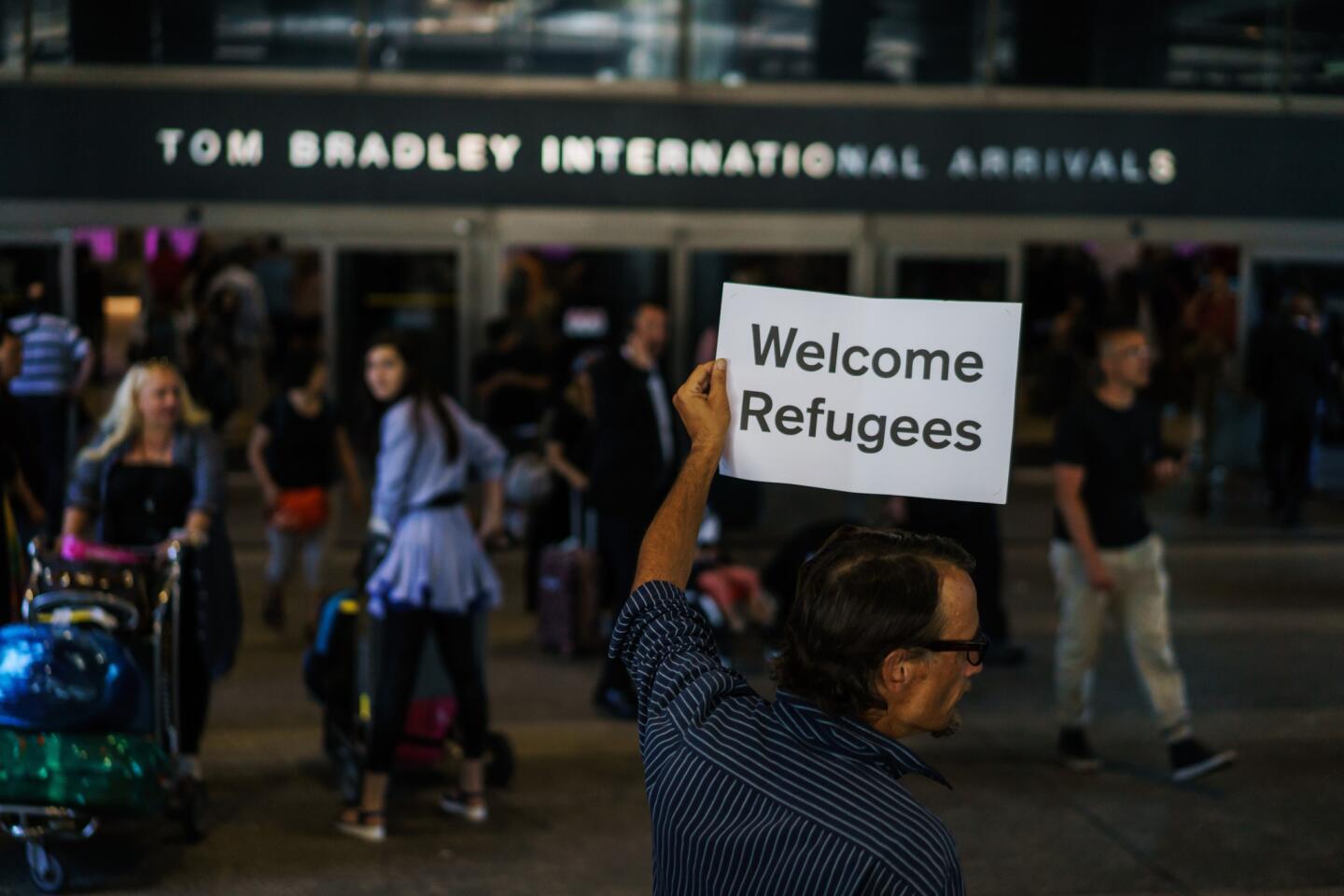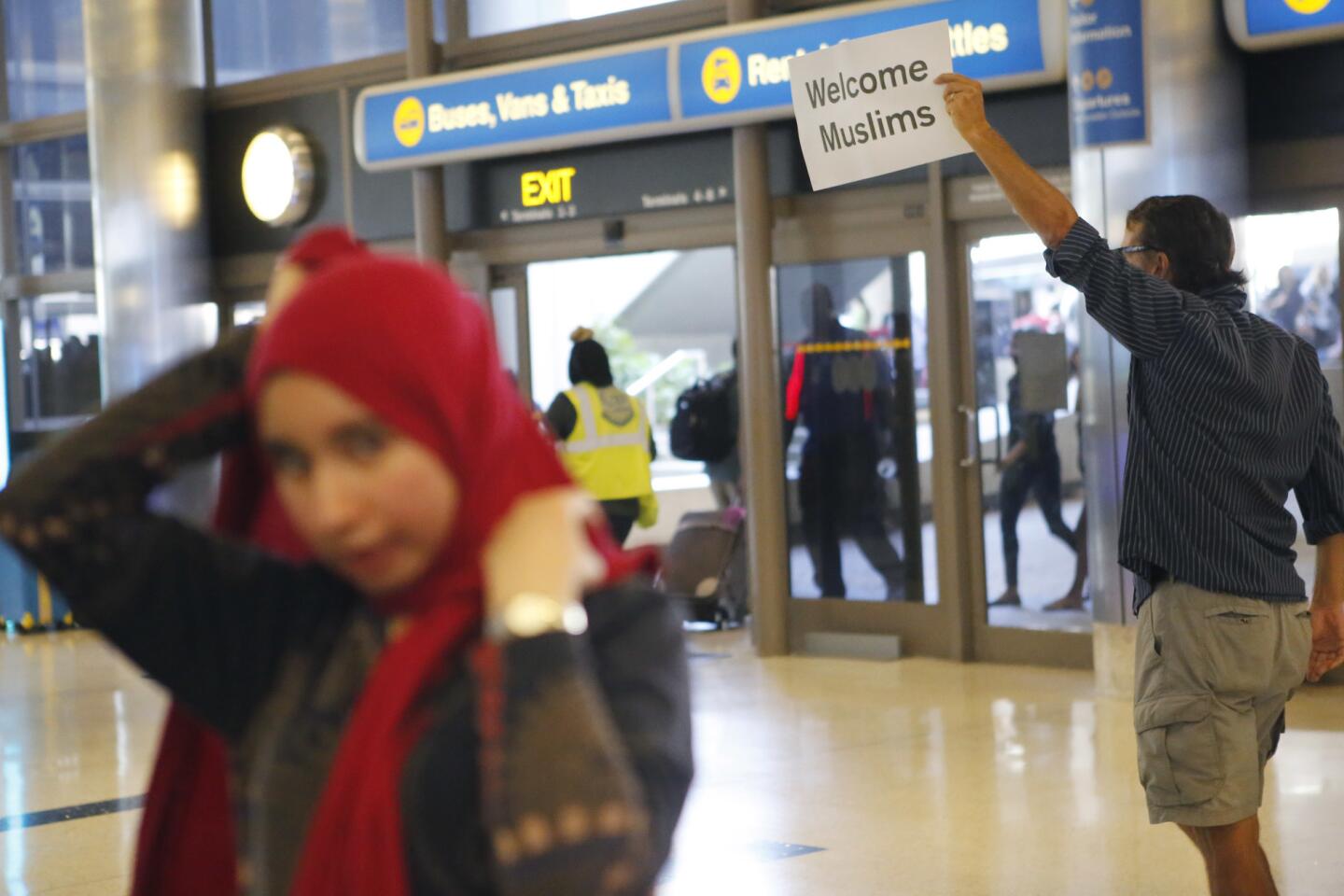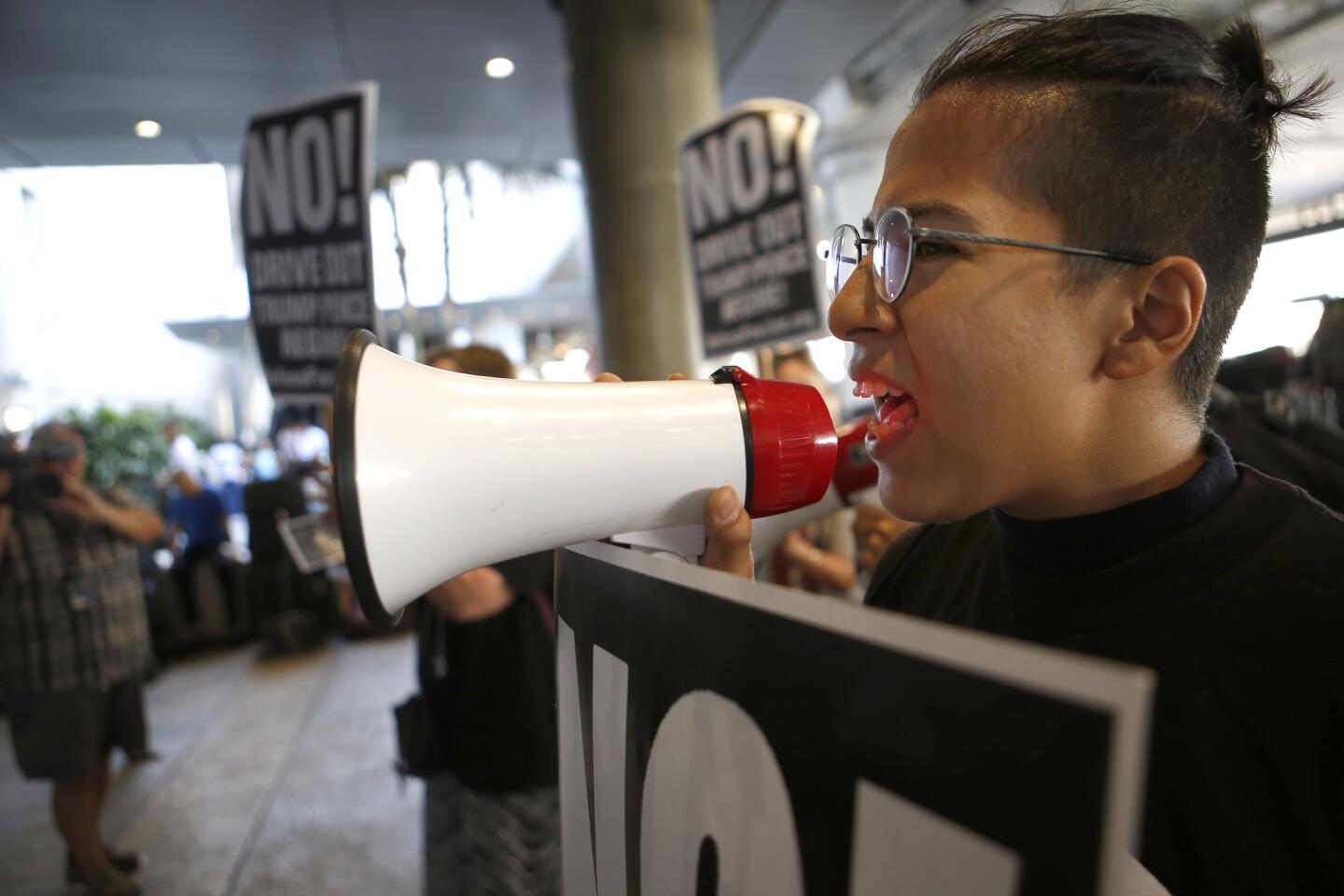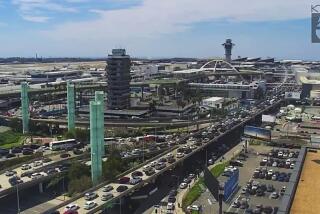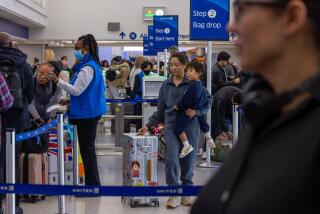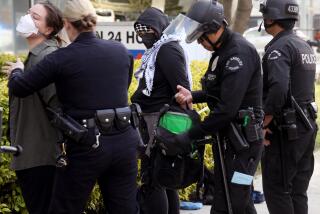Civil rights lawyers and protesters return to LAX as the new Trump travel ban takes effect
Hanadi Alhaj arrived at Los Angeles International Airport an hour before her mother’s flight was scheduled to land from Jordan to make sure nothing went wrong.
Although her mother holds a green card, Alhaj feared she’d be held in customs because she carries a passport from Yemen, one of the six countries included in the Trump administration’s travel ban, which took effect Thursday afternoon.
“My mom doesn’t speak English…I tried to come early if they need somebody to translate to her,” said Alhaj, a Yemeni immigrant. “I get worried maybe something will happen, they will stop her, they will go double check her.”
As Alhaj waited for her mother, a small group of immigrant-rights attorneys stationed themselves at LAX to prepare for the start of a new version of the travel ban.
Attorneys arrived around 2 p.m. — three hours before the ban took effect — and set up tables where they offered free legal aid and distributed copies of an eight-page travel advisory with information about the status of the new ban, as well as advice for travelers on interacting with customs officers. The lawyers said they plan to assess any impact on travelers who are seeking entry into the United States through Customs and Border Protection at LAX.
They were joined by a handful of activists holding signs that read, “No! Stop Trump/Pence” outside Tom Bradley International Terminal.
Alhaj, who immigrated to the U.S. 15 years ago, brought copies of her mother’s immigration paperwork to the airport just in case.
“She’s from one of the six countries,” Alhaj said. “Maybe it’s going to be an issue.”
Ameena Mirza Qazi, executive director of the Los Angeles chapter of the National Lawyers Guild, said people are still “very concerned” about the travel ban, even in the restricted form allowed earlier this week by the U.S. Supreme Court.
“There’s still a lot of confusion about how this affects people, how this affects family members,” Qazi said. “The [visa] process is already so thorough and it’s been that way for a very long time. To say someone can’t come in because they’re from a certain country…we know what this is about. This is about excluding Muslims as much as possible.”
Qazi said attorneys from the National Lawyers Guild and other organizations, including the Council on American-Islamic Relations and the ACLU, will monitor the way customs officials treat travelers.
Around 6 p.m., Qazi said she hadn’t noticed any significant impact on travelers. Still, she said, attorneys are monitoring flights from places such as France and Germany, where travelers who started from the Middle East catch connecting flights to the U.S., as well as flights from the United Arab Emirates.
“Today is a lot more waiting and seeing. In January, we actively knew of people being detained,” she said.
Extra police officers were not called in Thursday, but a “very large contingency” of officers is always on call to respond to major incidents, the Los Angeles Airport Police Department said. U.S. Customs and Border Protection officials said officers expected “business as usual.”
After the ban stalled for several months in federal courts, the U.S. Supreme Court on Monday allowed much of the ban to take effect while also applying significant restrictions that narrow the order’s impact.
With exceptions for people with a “bona fide relationship” to schools, employers, family or other U.S. entities, the ban will block admission of people from six majority-Muslim countries for 90 days as the government evaluates its vetting procedures.
The Trump administration has said that it needs the travel pause while it reviews and revises its vetting procedures for people arriving from Iran, Somalia, Sudan, Syria, Libya and Yemen. Trump has argued that the countries have ties to terrorism and that the ban will better protect the country against terror attacks.
In response to the Supreme Court’s decision, the Trump administration created relationship guidelines, which explain who is exempted from the ban. The guidelines, which were sent to embassies and consulates around the globe, do not count grandparents, grandchildren, aunts, uncles, nieces, nephews, cousins, brothers-in-law and sisters-in-law or other extended family members as “close” relations whose presence in the U.S. would allow people blocked by the travel ban to still enter the country. Visas that have already been approved will not be revoked.
Just before 4:30 p.m., Los Angeles City Atty. Mike Feuer stopped by the makeshift legal clinic at the airport on his way to a meeting with LAX Port Director Mitch Merriam.
“I have very strong concerns about the definition the State Department has given for ‘bona fide’ relationships here,” he said. “I want to learn more about the ways the federal government is evaluating who gets in.”
Feuer said he was troubled that the Trump administration in January also sought 90 days — which have since expired — to assess the efficacy of its vetting procedures.
“We’re well past that,” he said. “I don’t get it.”
Shayan Modarres, legal counsel for the National Iranian American Council, said the ban represented a “new low” by “targeting grandparents of American children.”
“It’s a lot of heartbreak, a lot of sadness and confusion,” he said. “To say that somebody’s grandparents present a national security threat or a risk to the U.S. underscores how absurd this Muslim ban really is.”
alene.tchekmedyian@latimes.com
Follow us on Twitter @AleneTchek and @sarahparvini
ALSO
Grandparents and cousins aren’t considered ‘close’ family under Trump’s new visa criteria
Immigrant advocates brace for new travel ban, criticize rules on ‘close’ family admissions
UPDATES:
7 p.m.: This article was updated with comments from the city attorney.
5 p.m.: This article was updated with information about attorneys arriving at LAX.
1:20 p.m.: This article was updated with comments from the National Lawyers Guild and the National Iranian American Council.
This article was originally published at 10:50 a.m.
More to Read
Start your day right
Sign up for Essential California for news, features and recommendations from the L.A. Times and beyond in your inbox six days a week.
You may occasionally receive promotional content from the Los Angeles Times.
